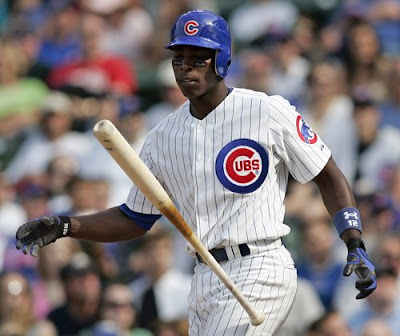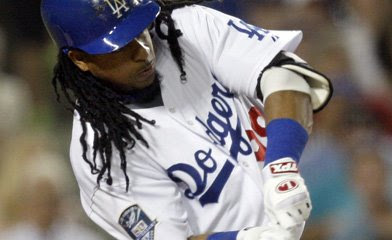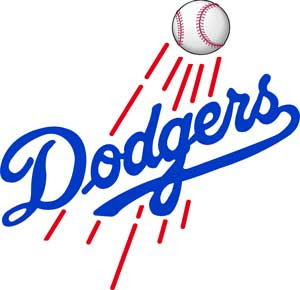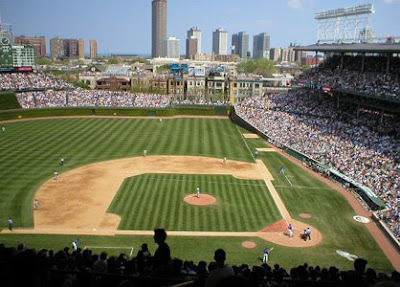By Danny Sheridan
Lately, we’
ve seen more than our fair share of Chicago teams that have underachieved, including the
'06 Sox,
'07 Bears, '07-'08 Bulls, and
'08 Cubs.
Here are ten that exceeded expectations.
If you think I missed one, let me know in the comment section.
Also, the cutoff for this list was 1990.
 10. 2007 Illinois football
10. 2007 Illinois football
With a combined record over the previous four seasons of 8-38, five wins would have made people in
Champaign happy during Ron
Zook’s third year.
After all, just two years earlier, when Illinois hosted Penn State, the scoreboard read Penn State 56, Illinois 3; at halftime.
So how did things turn around so quickly?
Four big reasons: the brilliance of
Rashard Mendenhall,
Zook’s recruiting, other Big Ten teams overlooking them and a “bend but don’t break” defense led by linebacker J.
Leman.
The win over top ranked Ohio State late in the year was most memorable, but earlier back to back victories over Penn State and Wisconsin set the tone for the entire season.
Take away the blowout loss to
USC in the Rose Bowl, and Illinois’ other three losses were by a combined 17 points.

9. 2008 White Sox
Back in April of this year, if you knew Nick Swisher would hit .219, Paul Konerko would be completely useless for the first five months, and that Javier Vazquez would lose 16 games, you had to figure this had all the makings of another 70 win season. Of course, you probably didn’t see Carlos Quentin turning into the AL’s best hitter, Gavin Floyd and Jon Danks combining for 29 wins and a 3.58 ERA, or Alexei Ramirez developing into a future star. It certainly helped that Detroit and Cleveland were arguably baseball’s two biggest disappointments, and that Minnesota had only three guys on their roster (Mauer, Morneau, Nathan) who were any good. Still, a Sox team that relied way too much on home runs and had to overcome some key injuries deserves a lot of credit for just getting to the playoffs.

8. 2005 Bears
In the Sports Illustrated issue previewing the 2005 NFL season, Paul Zimmerman had the Bears ranked 32nd out of 32 teams. So when the Bears started 1-3, no one was too surprised. Maybe it was Mike Brown’s famous “we suck” line that turned things around. Maybe it was how weak the NFC North was then. More likely was that the defense just decided to dominate the last 12 games, holding opponents to under double digit points in seven of those contests. The defense needed to be almost perfect to offset what statistically was the worst offense in football. Kyle Orton had games of 67, 68, 93, and 117 passing yards, and the Bears won all four of those games. However, even after winning 11 games, no one was too surprised when Carolina (well Steve Smith) exposed the Bears in the playoffs as a pretender.

7. 2000 White Sox
Mike Sirotka, James Baldwin, Jim Parque, and Herbert Perry all became household names, for at least one season anyway. Other than Frank Thomas, who should have won the AL MVP, this was a very inexperienced Sox team that had no business winning a league best 95 games. The top four starters, which included Cal Eldred, combined for 52 wins that season. Those same four ended up winning a combined 21 games for the rest of their careers, with Sirotka never pitching again and Parque making only seven more starts.
6. 1995 Northwestern Football
Here’s a pretty intriguing stat:
The 95 Northwestern team had exactly one player, receiver D’
wayne Bates, who went on to have any kind of career in the NFL.
By comparison, in the 1996 NFL draft, Ohio State had three guys picked in the first round, while Michigan and Penn State each had two.
During the mid-90s, the Big Ten was arguably the nation’s toughest conference, yet Northwestern, a program which
hadn’t had a winning season from 1972 through 1994, went undefeated in conference and got to the Rose Bowl.
Although they came up short to
USC and
Keyshawn Johnson in Pasadena, guys like Darnell
Autry, Pat Fitzgerald, and Gary Barnett helped put Northwestern on the map and produce one of college football’s most unlikely stories.

5. 2004-2005 Bulls
After starting 0-9, it looked like yet another lost season for a franchise that had won 17, 15, 30, and 23 games respectively the previous four years. Ben Gordon, Luol Deng, and Andres Nocioni were all rookies, and the Bulls appeared at least two years away from being any kind of contender. Then, we saw a rarity in the NBA: a team without a go-to scorer relies on its defense, hustle, and effort to go from a laughingstock to the third best record in the East. Here’s how you know that team greatly overachieved. The very next year the same nucleus returned, yet they had to go on a late season surge just to win 41 games. Oh yeah, one more thing: in the playoffs against the Wizards in 05, the Bulls starting frontline consisted of Othella Harrington and Antonio Davis. Enough said.

4. 2005 White Sox
An everyday lineup that includes Scott Podsednik, Juan Uribe, Carl Everett, and Tadahito Iguchi should not win 99 games and go 11-1 in the playoffs en route to a World Series. Sorry, but this Sox team was not that good. Cliff Politte and Neal Cotts were one-year wonders out of the bullpen, Jose Contreras turned into the best pitcher in baseball for the last month, and Jon Garland pitched like an ace all season instead of the number three pitcher he has been the rest of his career. Baseball playoffs are all about momentum, good pitching and catching some breaks, which the Sox had all of.

3. 1998 Cubs
Do these names ring a bell? Scott Servais, Jose Hernandez, Manny Alexander, and Henry Rodriguez. All were regulars on a Cubs team that somehow won 90 games and captured a wild-card spot. Besides Sammy’s 66 homers, that season had so many other memorable moments, like Kerry Wood’s 20 strikeout game, Brant Brown’s dropped fly ball, and Gary Gaetti’s go-ahead homer against the Giants in the one-game playoff. In all honesty though, this may have been one of the worst baseball teams in recent memory to make the playoffs. Mickey Morandini, Lance Johnson, Steve Trachsel, and Rod Beck all played way above their heads the entire season.
 2. 1994 Bulls
2. 1994 Bulls
When Michael announced his retirement right before training camp, it was logical to assume the team would take a big step back. But if not for Hue Hollins’ ridiculous foul call on Scottie Pippen at the end of game five in the second round against the Knicks, the Bulls win that series and likely go back to the NBA Finals. Despite having a weak supporting cast, Pippen absolutely carried the Bulls to 55 wins, and in the process asserted himself as one of the game’s top five players. With B.J. Armstrong and rookie Toni Kukoc as the team’s second scoring options, the Bulls won with great defense, balance (nine guys averaged at least eight points), and the coaching of Phil Jackson.
 1. 2001 Bears
1. 2001 Bears
Looking at the depth chart and statistics, there’s no way anyone can explain how that Bears team won 13 games.
Okay, so the defense was really good, especially the linebackers and defensive tackles, but still, Jim Miller was the quarterback, Anthony Thomas the running back, David Terrell and
Dez White were the number two and three receivers, and Walt Harris the top
cornerback.
I mean, the way they won some games was totally improbable: overcoming a 15 point deficit with five minutes left against the 49
ers to win in overtime, recovering an onside kick and throwing a hail
mary the very next week to force overtime and eventually beat the Browns, or having Martin
Gramatica miss a 30- yard field goal that would have given Tampa Bay a win.
With the same team back in 2002, the Bears went 4-12.


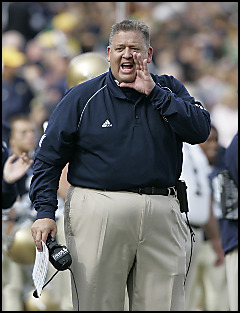
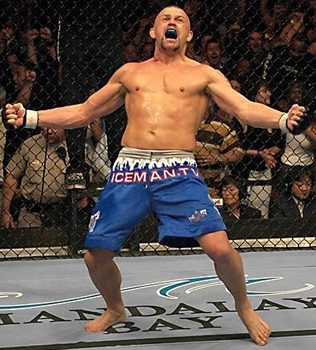





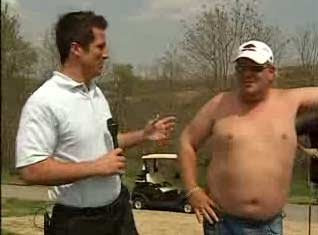
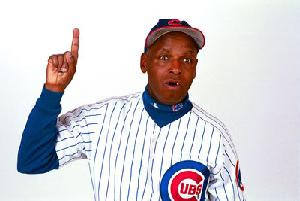
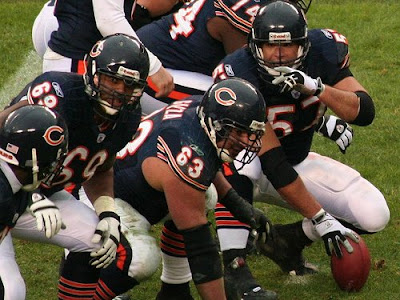
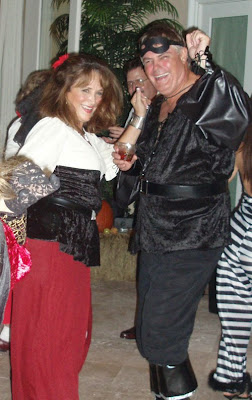
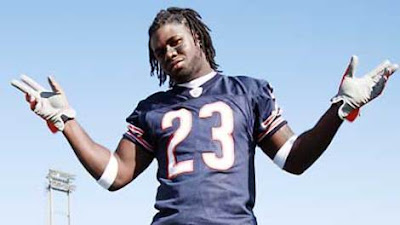
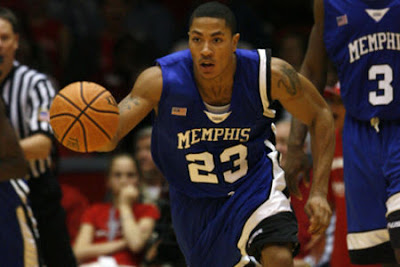
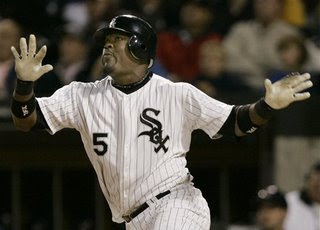

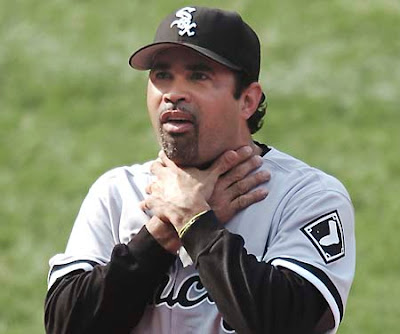
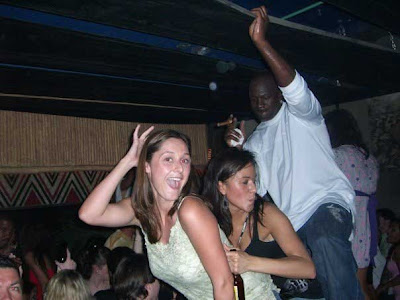
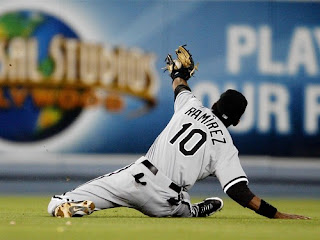
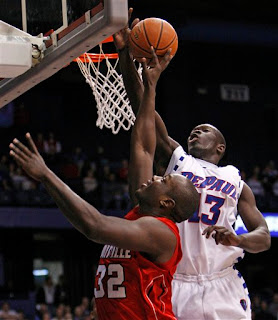

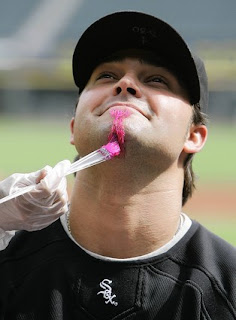
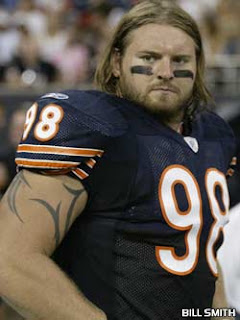
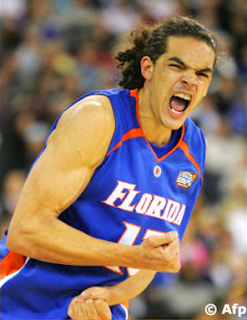
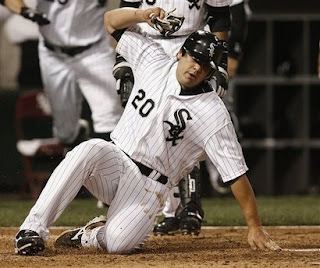
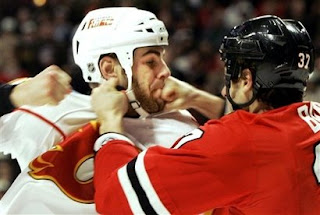
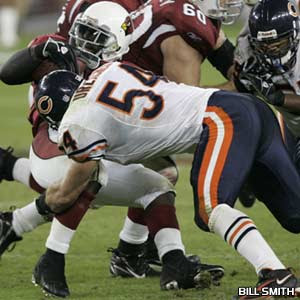


 Criticize Angelo for his failure to make good early round picks, giving Tommie Harris that big contract extension a month before training camp and not putting the franchise tag on Bernard Berrian, but give him some credit for one thing: there might not be a better GM in football at finding late second day draft steals. Look at some of the guys Angelo has chosen in the fifth round or later in the last few years: Kevin Payne, Corey Graham, Mark Anderson, Chris Harris, and Josh Beekman (last pick in the fourth round). Does that make up for wasting early picks on Cedric Benson, Michael Haynes, Mark Bradley, and Dan Bazuin? No, but I’m just saying.
Criticize Angelo for his failure to make good early round picks, giving Tommie Harris that big contract extension a month before training camp and not putting the franchise tag on Bernard Berrian, but give him some credit for one thing: there might not be a better GM in football at finding late second day draft steals. Look at some of the guys Angelo has chosen in the fifth round or later in the last few years: Kevin Payne, Corey Graham, Mark Anderson, Chris Harris, and Josh Beekman (last pick in the fourth round). Does that make up for wasting early picks on Cedric Benson, Michael Haynes, Mark Bradley, and Dan Bazuin? No, but I’m just saying. There’re two ways of looking at this. On one hand, the Bears are very banged up right now, with Tillman, Vasher, Lloyd, Hester, and Harris all nursing injuries. Then there’s my way. In a perfect world, the Bears bye would have come one week later, after their game against Detroit, who they could beat missing half their team. That would have given them two weeks off heading into the toughest stretch of their season: Tennessee, at Green Bay, at St. Louis, and at Minnesota.
There’re two ways of looking at this. On one hand, the Bears are very banged up right now, with Tillman, Vasher, Lloyd, Hester, and Harris all nursing injuries. Then there’s my way. In a perfect world, the Bears bye would have come one week later, after their game against Detroit, who they could beat missing half their team. That would have given them two weeks off heading into the toughest stretch of their season: Tennessee, at Green Bay, at St. Louis, and at Minnesota. It’s easy to say if not for Greg Olsen’s two fumbles, Tillman’s bonehead penalty, and Lovie Smith’s decision to squib kick, the Bears could be 7-0. Then again, if not for a fortunate goal-line stand (the Eagles play calling was ridiculous), and two fluke touchdowns on special teams against the Vikings, the Bears would have lost both those games. Really good teams find ways to win at the end of games, something the Bears are still figuring out.
It’s easy to say if not for Greg Olsen’s two fumbles, Tillman’s bonehead penalty, and Lovie Smith’s decision to squib kick, the Bears could be 7-0. Then again, if not for a fortunate goal-line stand (the Eagles play calling was ridiculous), and two fluke touchdowns on special teams against the Vikings, the Bears would have lost both those games. Really good teams find ways to win at the end of games, something the Bears are still figuring out.
 When David Haugh suggested that when Vasher gets back, Graham should still be the starter opposite Tillman, my eyes nearly bulged out. Then this past week, I’ve heard a lot of other people express the same sentiment. Did anyone else see Matt Ryan and Gus Frerotte absolutely tear apart the Bears secondary? Graham is a nice player, and an incredible story considering he didn’t play at all on defense last year. Still, the Bears didn’t pay Vasher 28 million for him to be the league’s best nickel back. And him missing nearly all of last season with a quad injury was probably the biggest reason the defense as a whole took such a big step backwards.
When David Haugh suggested that when Vasher gets back, Graham should still be the starter opposite Tillman, my eyes nearly bulged out. Then this past week, I’ve heard a lot of other people express the same sentiment. Did anyone else see Matt Ryan and Gus Frerotte absolutely tear apart the Bears secondary? Graham is a nice player, and an incredible story considering he didn’t play at all on defense last year. Still, the Bears didn’t pay Vasher 28 million for him to be the league’s best nickel back. And him missing nearly all of last season with a quad injury was probably the biggest reason the defense as a whole took such a big step backwards. Since every NFL team plays some form of it, there must be a reason why it’s so popular. Like any defense, cover-1, zone, man-to-man- it’s all about execution. That means the Bears can’t have any more games where the defensive line gets no sacks or fails to generate consistent pressure. It helps to have both starting cornerbacks out there too, which was the case when the Bears shut down Peyton Manning and Jake Dellhomme. We’ve seen the bad (Marcus Hamilton not getting deep enough against Atlanta), and the good (Zack Bowman’s pick that sealed the Vikings win) of the cover-2 these last two games.
Since every NFL team plays some form of it, there must be a reason why it’s so popular. Like any defense, cover-1, zone, man-to-man- it’s all about execution. That means the Bears can’t have any more games where the defensive line gets no sacks or fails to generate consistent pressure. It helps to have both starting cornerbacks out there too, which was the case when the Bears shut down Peyton Manning and Jake Dellhomme. We’ve seen the bad (Marcus Hamilton not getting deep enough against Atlanta), and the good (Zack Bowman’s pick that sealed the Vikings win) of the cover-2 these last two games. I’m guaranteeing right now that what we saw against the Vikings we won’t see again this season from the Bears. Orton isn’t that good, the wide receivers aren’t that good, and the offensive line isn’t good enough for the Bears to think they can win games by being a passing team first and a running team second. In the last four games, Forte has averaged less than three yards a carry. If that continues, they'll will be lucky to win eight games. I’ll admit though, watching the Bears score 48 points by throwing the ball all over the field was really cool.
I’m guaranteeing right now that what we saw against the Vikings we won’t see again this season from the Bears. Orton isn’t that good, the wide receivers aren’t that good, and the offensive line isn’t good enough for the Bears to think they can win games by being a passing team first and a running team second. In the last four games, Forte has averaged less than three yards a carry. If that continues, they'll will be lucky to win eight games. I’ll admit though, watching the Bears score 48 points by throwing the ball all over the field was really cool. Okay, so he’s not going to have six returns for touchdowns like he did in each of his first two years. And he has looked, well awful, on the majority of his returns. His blockers certainly haven’t helped much either. With all that said, he still has had a big effect on games. Just having Hester on the field has helped the Bears rank fourth in the NFL with an average position following kickoffs starting at their own 30.1 yard-line. He has also turned into a solid number two receiver, and reports are that the Bears may experiment with the Dolphins wildcat formation, using Hester in the Ronnie Brown role.
Okay, so he’s not going to have six returns for touchdowns like he did in each of his first two years. And he has looked, well awful, on the majority of his returns. His blockers certainly haven’t helped much either. With all that said, he still has had a big effect on games. Just having Hester on the field has helped the Bears rank fourth in the NFL with an average position following kickoffs starting at their own 30.1 yard-line. He has also turned into a solid number two receiver, and reports are that the Bears may experiment with the Dolphins wildcat formation, using Hester in the Ronnie Brown role. Technically, that’s correct, but of those seven, only Briggs and Tillman have played like Pro Bowlers this season. Urlacher, who still hasn’t figured out how to get off blocks, is only the third best middle linebacker in the NFC North. Harris has been a complete bust, and has quickly turned into the team’s most overrated player, surpassing even Olin Kreutz. Vasher has been injured, while Ogunleye hasn’t come close to reaching the level he played at last season. Having Brown healthy is obviously an upgrade over Danieal Manning, but even he has yet to deliver the big plays he has made a career out of. The Bears best defensive player so far? Alex Brown.
Technically, that’s correct, but of those seven, only Briggs and Tillman have played like Pro Bowlers this season. Urlacher, who still hasn’t figured out how to get off blocks, is only the third best middle linebacker in the NFC North. Harris has been a complete bust, and has quickly turned into the team’s most overrated player, surpassing even Olin Kreutz. Vasher has been injured, while Ogunleye hasn’t come close to reaching the level he played at last season. Having Brown healthy is obviously an upgrade over Danieal Manning, but even he has yet to deliver the big plays he has made a career out of. The Bears best defensive player so far? Alex Brown. Orton’s stats after seven games this season: 10 TD, 4 INT, 1669 yards, 62.2 completion percentage, 91.4 QB rating. Rex Grossman’s stats after seven games in 2006: 13 TD, 6 INT, 1639 yards, 61.4 completion percentage, 94.4 QB rating. I know that quarterback play has been so bad here for so long, and that it’s easy to see that Orton is no Grossman, but still let’s take it slow.
Orton’s stats after seven games this season: 10 TD, 4 INT, 1669 yards, 62.2 completion percentage, 91.4 QB rating. Rex Grossman’s stats after seven games in 2006: 13 TD, 6 INT, 1639 yards, 61.4 completion percentage, 94.4 QB rating. I know that quarterback play has been so bad here for so long, and that it’s easy to see that Orton is no Grossman, but still let’s take it slow.

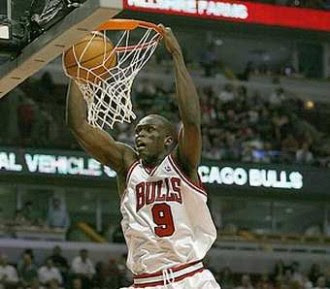


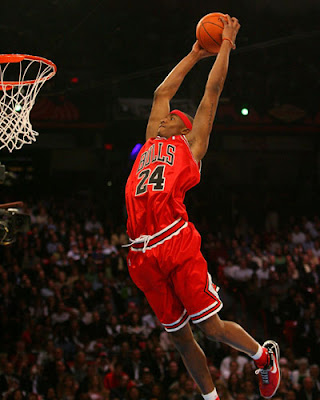
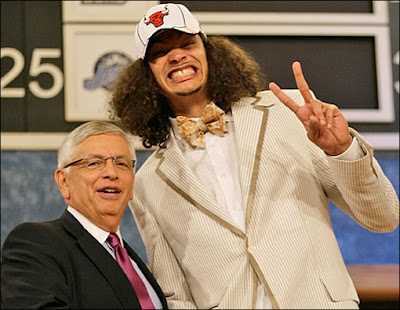
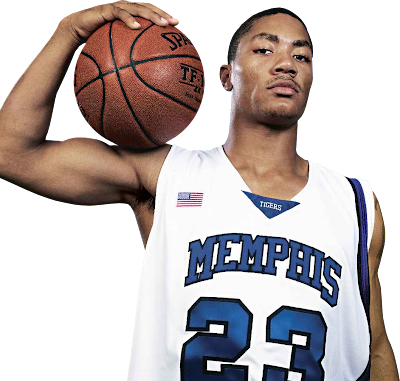
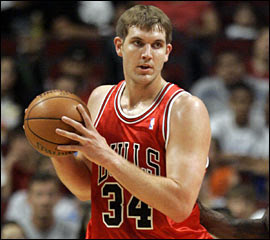
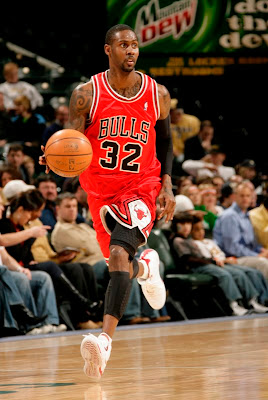
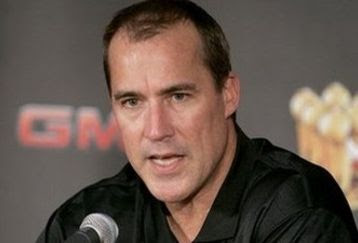
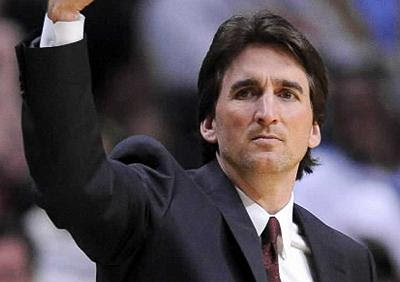

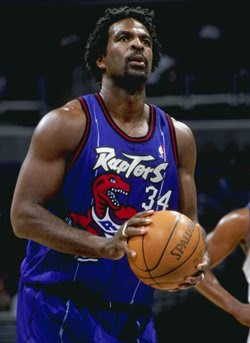

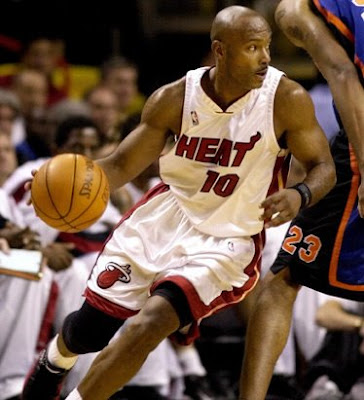




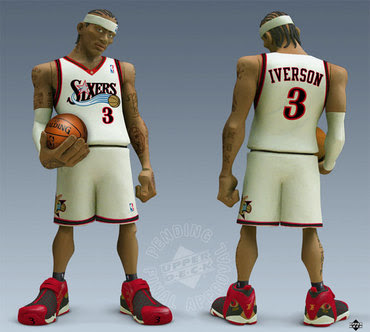



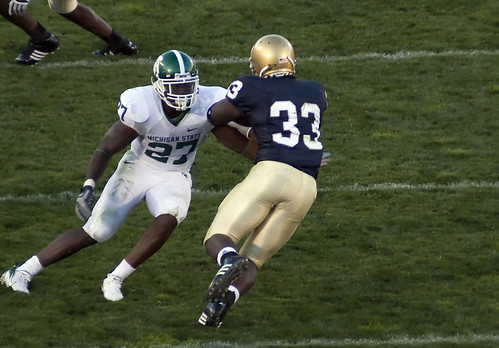

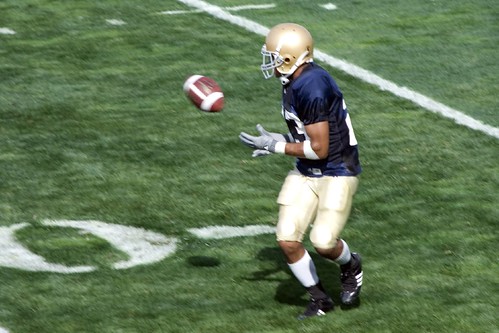



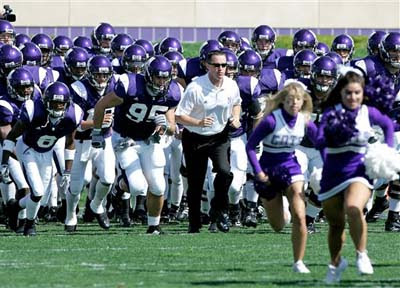



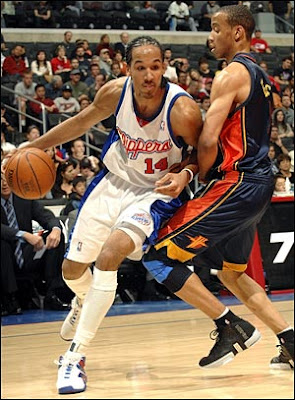
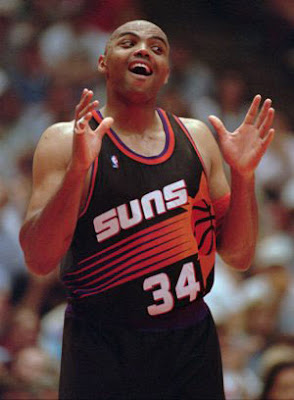

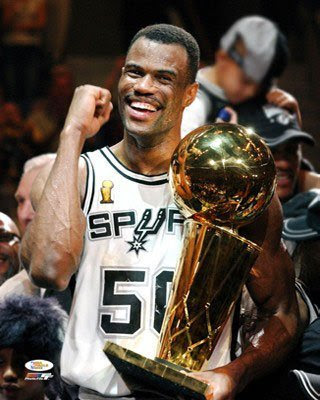



 10. 2007 Illinois football
10. 2007 Illinois football




 2. 1994 Bulls
2. 1994 Bulls





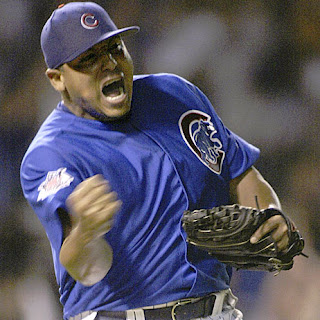


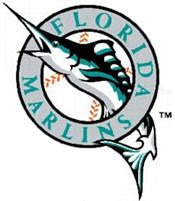
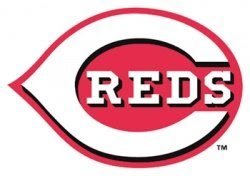

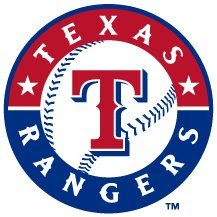

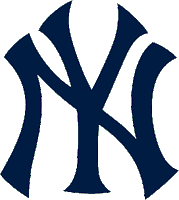

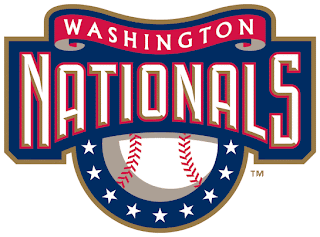
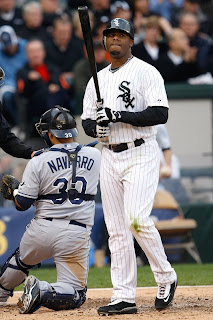









 9. Goal-line stand was a turning point
9. Goal-line stand was a turning point 8. Ron Turner is still clueless
8. Ron Turner is still clueless 7. The receivers might not be the weak link
7. The receivers might not be the weak link 6. They need to stay healthy
6. They need to stay healthy 4. Matt Forte is the real deal
4. Matt Forte is the real deal 3. The NFC North is wide open
3. The NFC North is wide open 2. Kyle Orton is more than just a game manager
2. Kyle Orton is more than just a game manager 1. Devin Hester needs to get going
1. Devin Hester needs to get going


